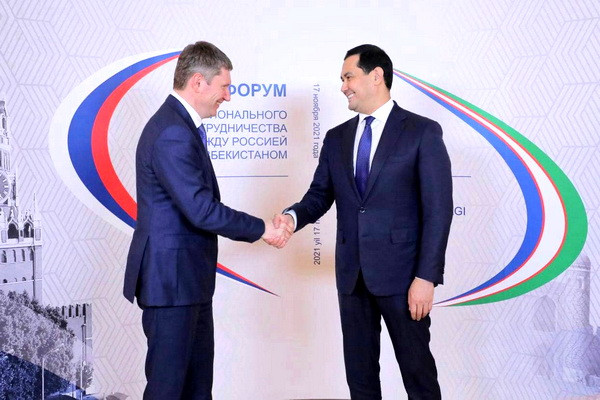Russia and Uzbekistan signed a comprehensive program of economic cooperation between the governments of the two countries for 2022-2026.
The document was signed within the framework of the second Forum of Interregional Cooperation between Russia and Uzbekistan held in Moscow by the Co-Chairs of the Intergovernmental Commission – Minister of Economic Development of the Russian Federation Maxim Reshetnikov and Deputy Prime Minister – Minister of Investments and Foreign Trade of the Republic of Uzbekistan Sardor Umurzakov.
The program will replace the current agreement. The new document takes into account the need to develop economic cooperation in the post-pandemic period using relevant tools, including electronic commerce, digitalization of the economy, new energy and water-saving technologies, as well as improving approaches in the migration sphere.
In addition, Russia and Uzbekistan intend to implement practical measures to combat COVID-19, exchange experience and information on vaccine production, prevention, diagnosis and treatment of patients with coronavirus.
The program also covers all traditional spheres – trade, industrial cooperation, transport, energy, agriculture, communications, finance, science, education, healthcare, culture, tourism and interregional cooperation. The main goal is to strengthen and diversify trade and economic ties based on mutual interests, and to raise the living standards of the citizens of Russia and Uzbekistan.
“In recent years, cooperation with Uzbekistan has reached a qualitatively new level – trade turnover and the number of projects have been steadily growing, while interaction between business and regions has intensified. At the same time, new challenges have emerged that have greatly changed the existing economic mechanisms. New opportunities have also emerged thanks to digitalization and the introduction of technologies. This required the modernization of the basic document that defines the strategic directions of our joint work in all sectors”, – Maxim Reshetnikov stressed. “We see great potential, including for the development of bilateral trade, as well as the creation of cooperative chains and joint production with subsequent access to the markets of third countries,” he added.
“By signing the Program, we have identified for ourselves the main vectors of interaction in various areas of trade, economic, investment, scientific, humanitarian, transport and logistics cooperation. Now the priority task is the qualitative and timely implementation of the Program. For this purpose, we will soon develop a Plan of Practical Measures that will include a list of joint projects in each direction, indicating specific results, deadlines for their achievement and responsible executors from both sides. This step underlines that our joint work has acquired a systematic character and is aimed at concrete results. It is also important that the Program is built for the long term and sets us large-scale tasks, for the implementation of which we will start working starting today”, – said Sardor Umurzakov, speaking about further steps in the framework of bilateral cooperation.







